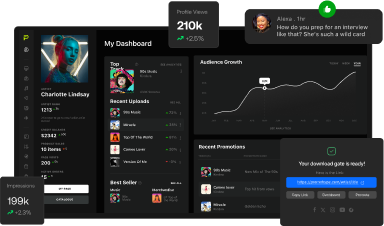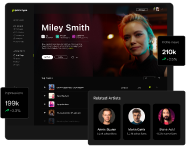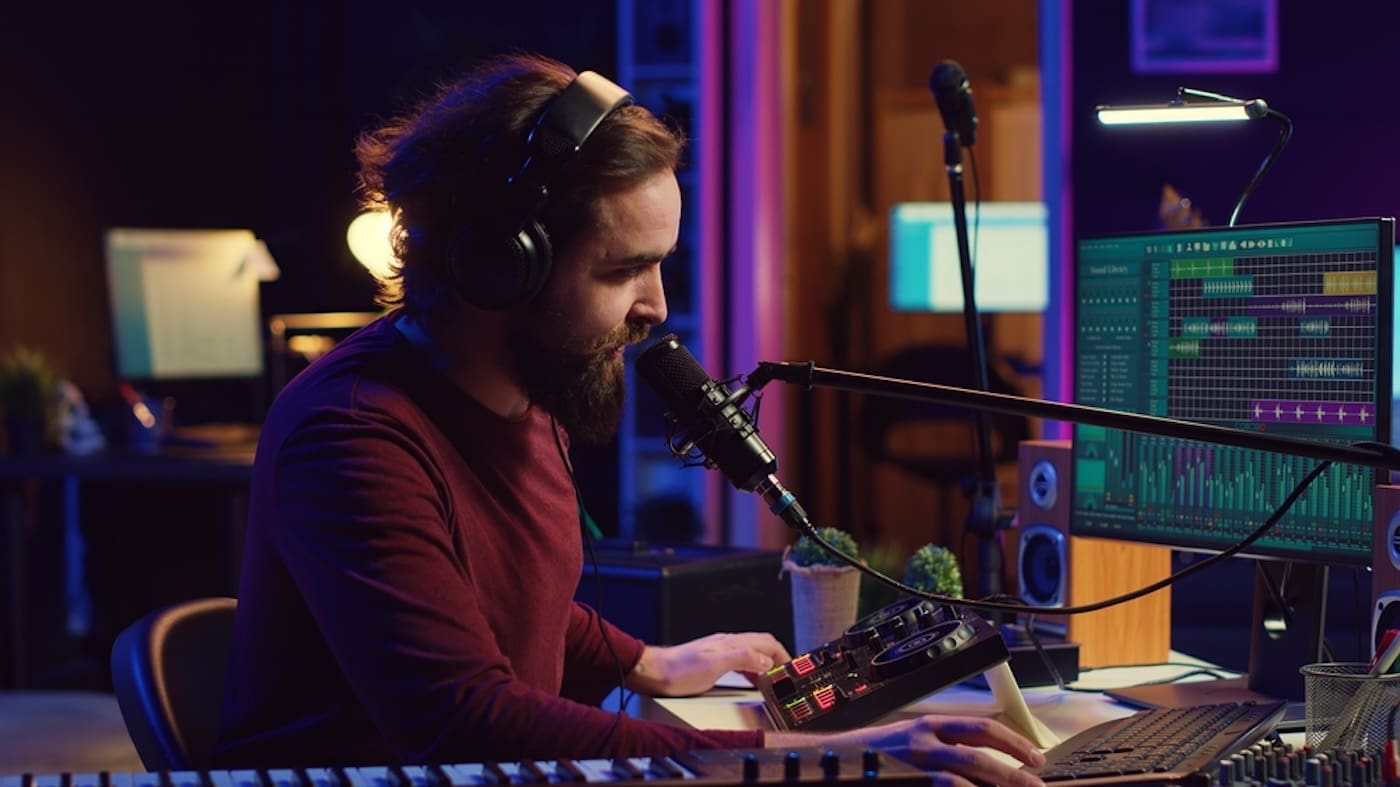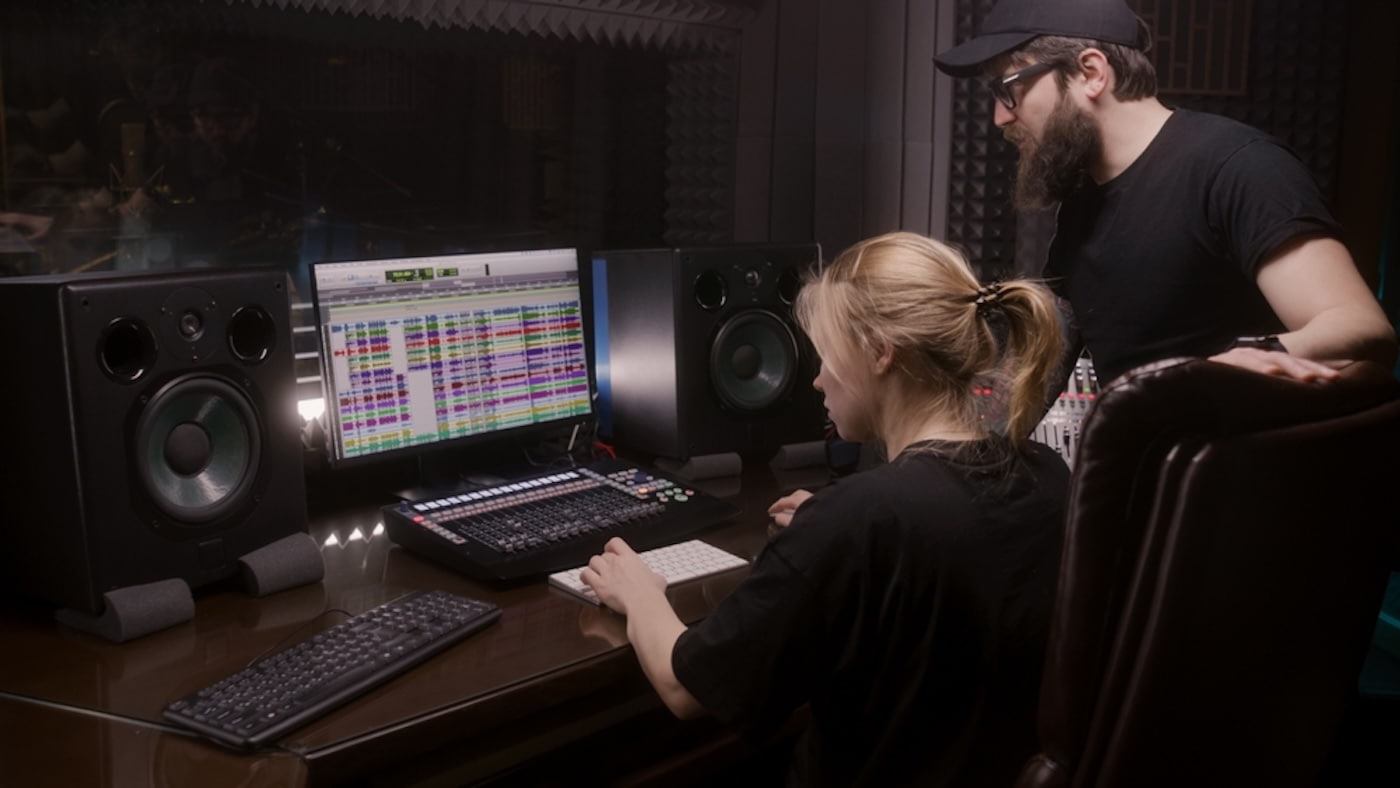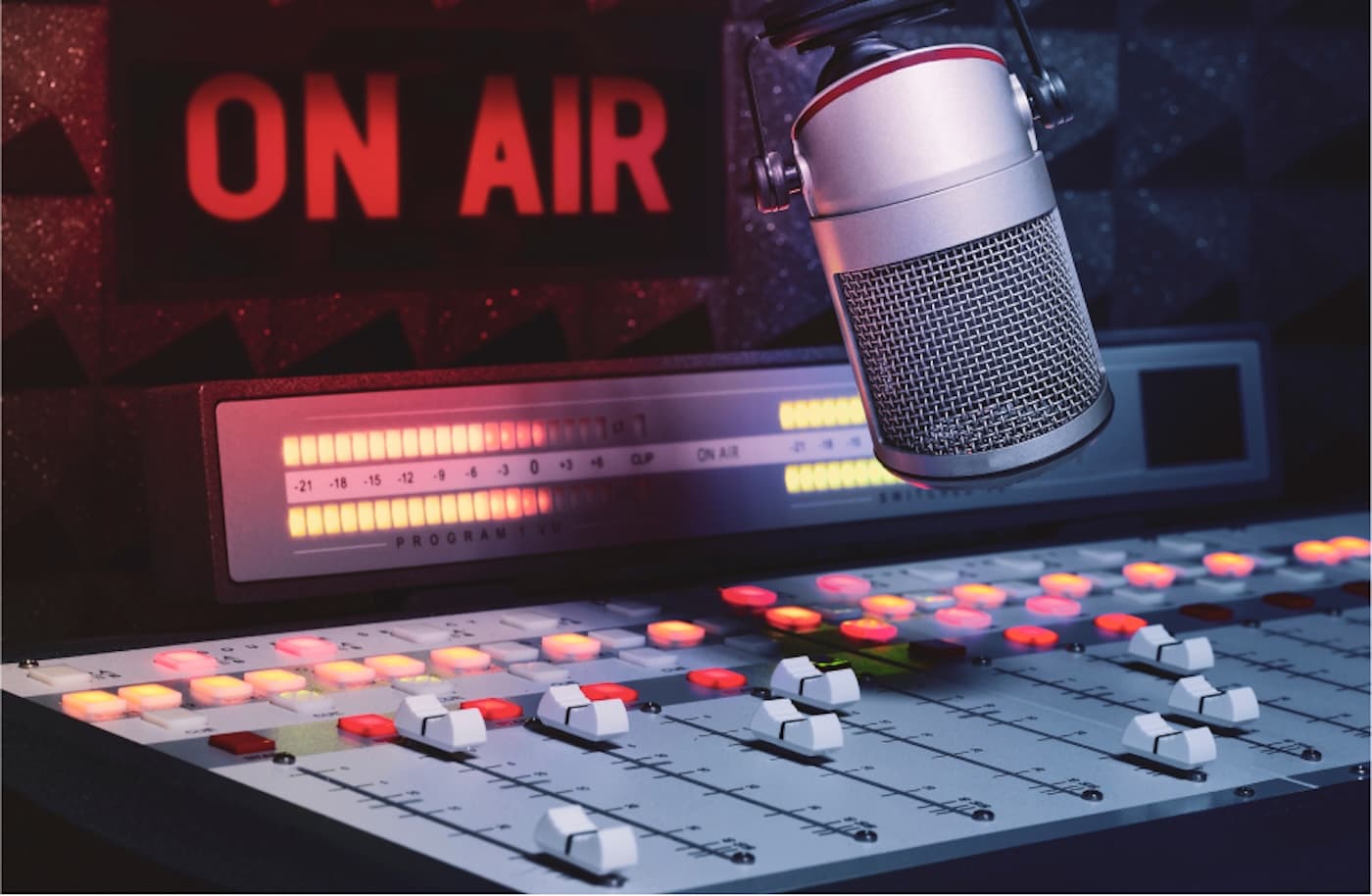
Independent artists looking to develop their music careers can reach out to radio stations to get their songs heard by a larger audience.
Learning how to submit music to radio stations is simple, with tried-and-tested methods for attracting their attention and playing your music.
This step-by-step guide covers preparing and submitting your music while discovering the best radio stations that suit your musical style.
Get Early Access
To Promo Hype
How To Submit Music To Radio Stations In 2025
Whether approaching legacy stations or contacting internet radio stations, the submission process is essentially the same.
Here are the steps you should take when submitting your music to radio stations to maximize your chances of a response:
Step 1: Research Relevant Radio Stations
With thousands of radio stations to choose from, knowing where to begin submitting your music can be daunting.
You can streamline the process by researching relevant radio stations that play your music style and adding these to a spreadsheet.
This spreadsheet can include their contact information, submission guidelines, and a field to indicate any responses.
While getting airplay on a major station is challenging, there are plenty of smaller local stations you can approach at first.
There are also many cool internet radio stations where you can get your music heard by like-minded fans of your chosen genre.
Research these platforms to populate your spreadsheet, referencing forum discussions and chatting with other musicians.
You can also check out the Independent Online Distribution Alliance to find where you can submit your music.
Submitting to music podcasts can also increase your chances of exposure, so create a separate spreadsheet for this category.
Join the Promo Hype Community.
Step 2: Verify The Music Submissions Process
Navigating the online space can be a minefield, from Spotify’s changing algorithms to the required processes for submitting to radio.
To get this right, you need to check with each radio station individually to review the guidelines you need to follow.
These typically include where to send the submission and whether or not they accept physical CDs through the mail.
Most will likely prefer a digital audio file, and many also request additional information, such as your artist profile.
If you can’t find this information on their website, send a polite email asking for confirmation of the submission process.
Step 3: Prepare A Radio-Friendly Track
Sending in a twenty-minute progressive rock song might impress the listeners, but it has little to no chance of getting aired.
To increase your odds of receiving a broadcast, you need to prepare a radio-friendly version suitable for airplay.
Here are some processes you need to follow to create a track that is friendly for radio stations:
- Adjust the length: If you listen to the radio often, you’ll notice that most tracks they play sit within the three to four-minute range. Should your submission exceed this length, edit it to a shorter version by removing verses and choruses.
- Emphasize choruses and catchy hooks: Since radio broadcasts shorter and snappier edits, maximizing the time and focusing on the hook makes sense. These elements are what the listeners will recall the most, so strive to place them front and center.
- Remove inappropriate content and language: While pop songs are rarely written with vulgar language, other genres often use such lyrics. To avoid violating broadcasting regulations, edit this content before submitting it.
If you’ve already written a song with these limitations and recommendations in mind, you’re ready to continue to the next step.
Step 4: Create An Electronic Press Kit
Some artists complement their music submissions with a dedicated electronic press kit, similar to a radio package.
An electronic press kit, sometimes called a music press kit, showcases the artists or band members and is excellent for public relations.
It includes links to biographies, collections of photographs and videos of live performances, and links to social media pages.
This kit gives radio stations a clear insight into the tone and genre of the artists, whether playing rock, pop, country, or jazz.
An EPK also opens up new opportunities for additional feedback from the radio station about how you present your brand.
Get Early Access
To Promo Hype
Step 5: Upload New Music To Streaming Platforms
Before you submit music to radio stations, you should upload your songs to streaming platforms to expand your online presence.
These outlets include Spotify, Apple Music, Amazon Music, and YouTube, which can significantly boost your reach to new listeners.
These services host the most popular music genres and are the go-to platforms for most people looking for new releases.
A strong presence across the major music streaming platforms will also give music directors a great impression of your brand.
Ensure your accounts on these platforms are current and feature your artist’s logo and other branding elements.
If you’re struggling with uploading to streaming platforms, you can use digital music distribution and promotion services.
Such services streamline the process, providing tools for scheduling and marketing that drive traffic where it counts.
You can include links to your artist profiles for each platform when sending your music submissions to radio stations.
Step 6: Be Active On Social Media
An active presence on social media platforms is another effective way to increase your chances of success when submitting to a radio station.
Social media provides opportunities for engaging with your audience and sharing new releases and live event dates.
While Facebook is widely used for its powerful events listing tools, TikTok, Instagram, and X all provide powerful tools for musicians.
Going viral on TikTok is a surefire way to garner the attention of a radio station and guarantee your music will be seriously considered.
Likewise, social media is also an effective tool for communicating with radio station hosts you’re hoping to reach out to.
By commenting on their posts and starting conversations, you can lay the groundwork before you submit your music to their station.
Your social media channels can also host your artist’s Bio and provide information and contact details to your followers.
Most of all, social media lets you showcase your style and personality, putting a face to your music when building relationships.
Recommended reading: Find out how to make music like a pro.
Step 7: Work With A Record Label Or Publisher
If you’re a musician or producer with representation through a publisher or label, they can help reach out to stations.
Record labels looking for artists also have strong ties to radio DJs and know which shows best fit your music.
Send your manager a list of the stations you’re interested in and arrange a discussion to see how you can move things forward.
Some record labels have an arrangement with stations whereby they pay a fee to guarantee airplay and other promotional services.
Promo representatives usually conduct this process due to long-standing relationships with the station’s music directors.
Labels then monitor and analyze weekly reports from the stations to see how effectively these campaigns are performing.
If you don’t have a label, getting airplay will significantly increase your chances of getting noticed by the right people.
Step 8: Partner With An Online Music Distribution Platform
While many independent artists aren’t signed to a record label, other services can improve their online presence.
Online music distribution platforms help artists reach all streaming platforms, schedule releases, and promote to their fans.
They also assist with crafting specific marketing strategies for members that can be easily modified for submitting music to radio stations.
This setup increases their overall visibility and engagement, making radio stations far more likely to consider your music.
It also demonstrates a professional attitude and goal-oriented approach to music, leaving a strong impression on the radio station.
Step 9: Submit Your Music
With your song completed and all your assets prepared, it’s time to submit your music to your selected radio stations.
Before hitting the “Send” button, triple-check everything is in order and refer to the station’s specific submission guidelines.
Creating a checklist for each radio station takes little time and will ensure that your submission meets the highest possible standard.
Once your music submissions are sent, continue improving your musical skills while waiting for a response.
Not all radio stations will respond, and if you haven’t heard back for a few weeks, consider sending a follow-up email.
That said, avoid being pushy and sending repeated emails enquiring about your submission’s status, as this will be off-putting.
Reach a global audience with Promo Hype’s distribution services.
Step 10: Learn From Feedback
Whether your submissions are accepted or rejected, the radio station will likely give you feedback on your music.
This could be constructive feedback about your song’s structure or advice on editing your music to make it friendlier for radio.
It can also cover technical aspects, such as mixing and mastering, allowing you to refine your use of music production software.
Whatever feedback you receive, try to incorporate it into your composition and production methods on future tracks.
If your songs are on social media, gather your fans’ feedback before submitting your music to a radio station.
While all feedback surrounding music is inherently subjective, it can often improve your recordings and address blind spots.
Tips For Submitting Music Directly To Radio Stations
If you’re an independent artist without management or backed by a label, you can still submit music to radio stations directly.
Here are some tips for those considering this approach to help increase the chance of success:
- Adopt a personalized approach: While sending boilerplate messages and group emails might save time, they lack care and consideration. When approaching radio stations, make each submission unique and tailor the text to each station’s style.
- Network with radio station DJs: If you can engage with any DJs who host shows at a given radio station, try to start conversations. This step can be as simple as posting comments on their social media pages to show your support and appreciation for their content.
- Use a professional mastering service: A great song means little if the overall production values are amateurish, and will likely lead to instant rejection. Professional mastering services can prevent this issue from arising, and don’t have to cost thousands of dollars.
- Create an electronic press kit: Another great way to present your work professionally is by creating an electronic press kit to supplement your submission. You can find EPK templates online to ensure they are structured correctly and include all relevant information.
If you know other artists who have successfully submitted music to radio stations, ask about their experiences and take their advice on board.
Distribute Your Music Globally With Promo Hype
Capturing the attention of a radio station is easier when artists have a strong presence across the major streaming platforms.
By partnering with Promo Hype, you can promote your music and access the following services:
- Global distribution across all streaming platforms: Promo Hype members can instantly distribute across all streaming platforms, including Spotify, TIDAL, Apple Music, and Amazon Music. Promo Hype also assists with scheduling and promotion, tying new releases to upcoming tours and one-off gigs.
- In-depth analysis through powerful analytics: Understanding how your music is performing is essential for making decisions about your artistic direction. Promo Hype’s in-depth analytics show which songs perform the best on which platforms and where the most engagement is coming from.
- Valuable feedback from Promo Hype’s community of independent artists: If you’re struggling with production or looking for artists to collaborate with, Promo Hype’s got you covered. The lively Community feature allows you to engage with artists and build long-lasting relationships.
With in-depth industry experience and the latest distribution and promotion tools, Promo Hype is the go-to platform for independent artists.
Summary
Submitting your music to radio stations and getting airplay can be a game-changer for independent artists who want to showcase their talent and build a fan base.
Adopting the strategic approach outlined in this guide will streamline the submission process and ensure the right people hear your music.
Once your submissions have been accepted, you can capitalize on the recognition and use the airwaves to build your audience.
Get Early Access
To Promo Hype
Join Promo Hype
